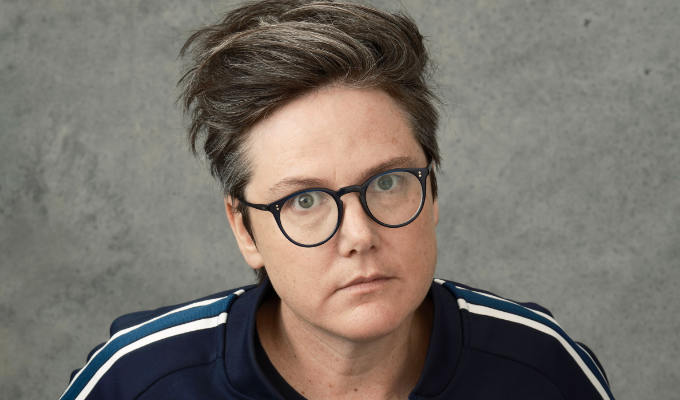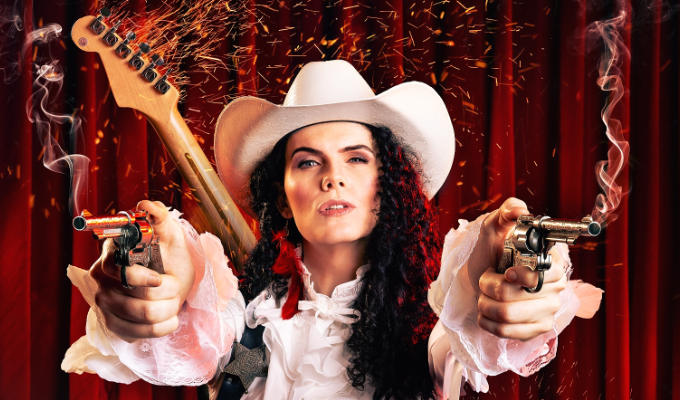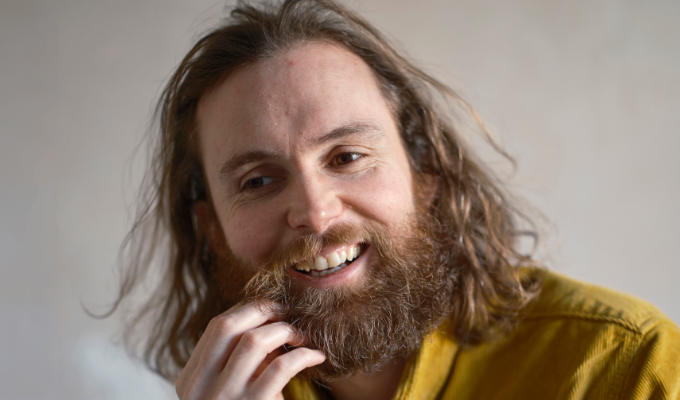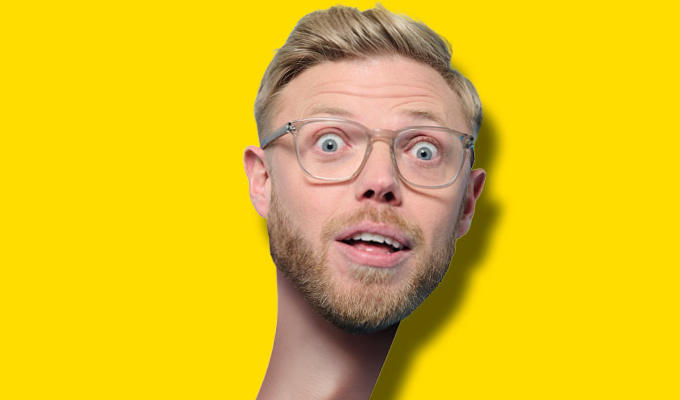 © Ben King
© Ben King 'It doesn't matter how much money or success I have, every day I'm on the struggle bus a bit'
Hannah Gadsby talks fame, autism... and people hating her comedy
‘People have a lot of opinions about me,’ Hannah Gadsby says, in what must be the pinnacle of understatements
When her breakthrough special Nanette hit Netflix in 2018, her audacious decision to sometimes abandon the search for laughs, lest any flippancy dilute the trauma she was processing, split the audience like few other stand-up shows.
The divide largely fell along ‘culture war’ lines, between those who thought talking about the bigots who made her younger life hell – at at time when her homosexuality was still criminalised in her native Tasmania – was some form of unfunny woke nonsense, and those who praised her bravery for speaking up as a usually marginalised voice.
‘I felt like I was under the radar, then I really touched some nerves.’ she says now over Zoom. ‘And I didn't really care. I think the nerves that I touched are fairly childish, so I just let people have their emotions.’
For despite the tired insult that anyone with liberal tendencies is some delicate snowflake, Gadsby is remarkably thick-skinned about the brickbats. ‘I lived a life before comedy and that's a lot harder than people not liking my jokes,’ she said. ‘I think that perspective is really toughened me up.’
Even so, her vilification from some quarters only grew last autumn when Netflix boss Ted Sarandos addressed concerns that Dave Chappelle’s material on the platform was homophobic and transphobic by citing Gadsby’s shows as evidence of their support for diverse stories.
‘Hey. Ted Sarandos. I would prefer if you didn’t drag my name into your mess,’ Gadsby replied at the time. ‘Now I have to deal with even more of the hate and anger that Dave Chappelle’s fans like to unleash on me every time Dave gets 20 million dollars to process his emotionally stunted partial word view. Fuck you and your amoral algorithm cult.’
Cue Chappelle – and a lot of his supporters on the internet – branding her ‘unfunny’ with various degrees of anger.
Speaking now, however, Gadsby is reluctant to drawn into too much condemnation of Chappelle’s stance. ‘I don't mind talking about it, but most of what I have to say is on the subject of intersectionality and I think two white people talking about it is not a great space to talk about that,’ she says. ‘Having a decent conversation about this in public deserves a more representative channel.’
If only Chappelle had shown a similar concern for how other people experienced discrimination based on their identities, he probably wouldn’t have taken pot shots at trans people nor joked about gleefully punching lesbians – and we wouldn’t be having this conversation. But in our interview, the point goes unsaid.
Not that Gadsby is reluctant to bite the hand that feeds her. She’s proud to share a new gag about the company that transformed her life. ‘Netflix is like a family.’ she deadpans. ‘And like all families – they hate gay people.’
The platform also released her follow-up, Douglas, in which she revealed her autism diagnosis late in life. And if they do release another show, Gadsby vows to take every advantage of their policy of giving comedians the freedom say what they will.
‘I will dedicate a large portion of my next Netflix special talking about how dumb Netflix is,’ she says. ‘Let’s see how brave they actually are about freedom of speech.’
But she also realises she doesn’t have Chappell’s clout. ‘It’s ultimately about profit,’ she says. ‘They talk about freedom of speech, but if people weren't making a profit for them, it’d be an entirely different conversation. And I'm not making a big profit for Netflix.’
Gadsby has faced calls to take her work off the platform, but says that while she could technically do that, ‘where would it go? They own it.’
Still, after the heavyweight, challenging content of her last two shows, she promises that her new show Body Of Work, which kicked off a UK tour in Manchester last night, is a little more feelgood.
‘It is a storytelling show, which I think is what I always did best,’ she said. ‘Nanette and Douglas moved away from that. so I’ve tried to swing it back toward weaving stories. But I can't help myself. I’ll still have opinions on things.’
Topics she’ll cover include breaking her leg on a recent trip to Iceland - hard to avoid given that she takes to the stage in a wheelchair - and her new life on comedy’s A-list, even if it was interrupted almost as soon as it started by a little global pandemic. ‘Now I’m wondering if my fame is still there,’ she says. ‘I haven’t been rubbing shoulders with the stars, I’ve been in a small country town in Australia under very harsh lockdown.’
She’s been holed up with her wife, Jenney Shamash, who was assigned to produce Nanette off-Broadway, before they hit it off as a couple, and married last January. Spending lockdown in rural Australia was something of a ‘culture shock’ for the comedian’s California-raised wife… although it did give Gadsby some respite from the spotlight of the past few years, which she admits she’s not entirely comfortable with.
‘I don’t like the fame part of this,’ she says. ‘Before this all kicked off. I would have classed myself as a very successful comedian. I was comfortable, I was earning a living wage, which is not a thing many artists are able to do. I know that I'm living other people's dreams right now but – and I can't stress this enough – it’s not mine.’
Nonetheless she’s going to go on the ‘wild ride’ of fame ‘because it's interesting, so why would you say no? But it's not like I'm doing the thing I dreamed of – like who dreams of this? It’s silly.’
While her new status has opened doors, she says ‘stand-up’s always going to be part of what I do simply because I don't do ambition. I don’t come from a place where grand visions pay off. In Australia, you're not rewarded for having grand visions. We have the tall poppy syndrome [in which successful people are resented and cut down] and it's quite fierce. I was brought up on that. It's a silly cultural phenomenon, but it's ingrained in me so it's like, "don't get ahead of yourself".’
However, one benefit from her new celebrity was a book deal, and her memoirs, Ten Steps To Nanette, will be published later this month. Gadbsy says that being diagnosed with autism helped her write it, giving her a fresh perspective on aspects of herself she couldn’t figure out before.
‘I now know it's a waste of time trying to fit in or be a certain type of female performer,’ she says. ‘My perspective on the world is so atypical to what I physically represent in the eyes of other people. There are a lot of things about being a woman, or being female adjacent, and on the spectrum. There's an expectation that you are good at interpersonal situations, and I'm very much not – and that's caused a lot of distress. I think guys can get away with a little bit more social awkwardness because it's kind of expected.
‘I spent most of my life trying to explain myself to myself first, then my audience and [the diagnosis] just freed up so much time! Now I can have hobbies,’ she jokes.
She acknowledges that her brain wiring in some ways helps her comedy ‘because the input is not intuitive, so you are breaking things down and noticing patterns. I think that's a real strength when it comes to framing the world in terms of exposing its silliness because most people are just going to go "oh that’s just the way it is". And the atypical way of thinking is "this doesn't actually make sense". And because, it takes a bit longer to get from A to B, you see more things, then you bring that to attention to the neurotypical audience. ‘
‘But there's a lot about my life which will never be easy. It doesn't matter how much money I have, or how much success I have, every day is a little bit on the struggle bus.’
• Interview by Steve Bennett
Published: 7 Mar 2022






